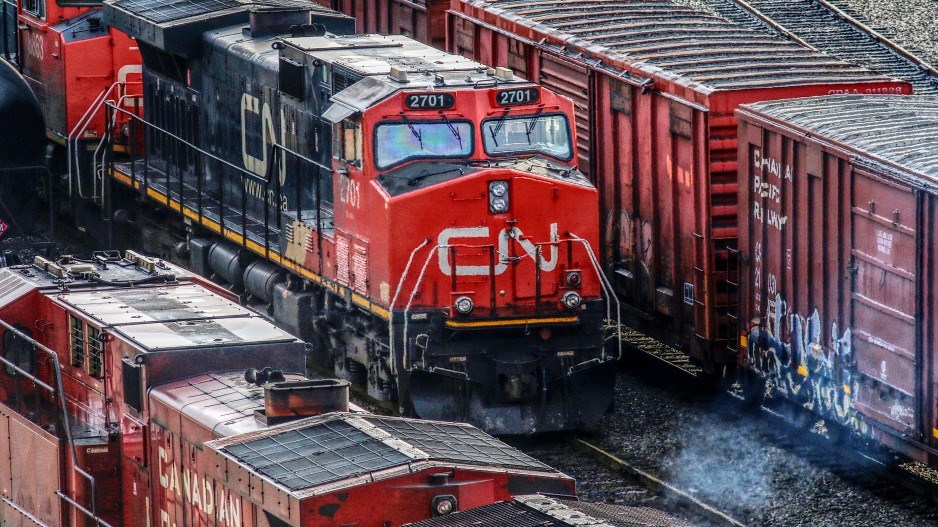B.C.’s business community is urging Ottawa to step in to end the rail stoppage paralyzing the movement of goods and people throughout Canada.
Thousands of Teamsters Canada Rail Conference railway employees stopped their work for Canadian National Railway (TSX:CNR) and Canadian Pacific Kansas City Ltd. (TSX:CP) after being locked out by their employers early Thursday.
The labour dispute has also resulted in the suspension of West Coast Express services in Metro Vancouver.
“Every day of this stoppage delivers another blow to people’s wallets, endangering the livelihoods of small business owners and employees across the country,” Bridgitte Anderson, president and CEO of the Greater Vancouver Board of Trade, said in a statement.
“Tens of thousands of workers across multiple sectors could see their jobs and incomes affected as plants shut down or products have no place to go. The cost of goods will rise, hitting Canadians already struggling with the effects of inflation.”
She’s calling on the federal government to consider binding arbitration “and any other method needed to end the stoppage.”
A full rail stoppage would cost the Canadian economy $1 billion a day, according the Canadian Manufacturers and Exporters association.
Blair Qualey, president and CEO of the New Car Dealers Association of B.C., said previous disputes have had a significant impact on dealers and consumers.
“We simply cannot afford a repeat,” he said in a statement.
“New vehicle inventories are already fairly tight for various manufacturers and dealers, and a rail strike has the potential to effectively turn the tap off. It means that consumers who have ordered vehicles or dealers who are in the process of ordering vehicles won’t be seeing them anytime soon.”
Qualey said drivers needing repairs and servicing for their cars will be impacted by the lack of needed parts reaching their intended destinations.
And ongoing job action could have further political and environmental implications, according to Qualey.
“An extended rail service disruption also has potential consequences with respect to provincial zero emission vehicle mandated sales targets,” he said.
“Simply put, if dealers don’t have vehicles to sell to consumers, they will be unable to meet mandated targets, and that becomes a vicious cycle.”
Rail disruptions in recent years due to activist blockades, floods and wildfires gives some small hint of what Canada could be in for.
“I think the pain would be felt at the industry level immediately, and at the consumer level a week later, at the most,” said Ulrich Paschen, a professor specializing in supply chains at the Melville School of Business at Kwantlen Polytechnic University.
“We always call this a supply chain, but it really is a pretty complex [network]. And if you take the two largest railroads in Canada out of that equation, you are taking a big chunk out.”
In 2020, in solidarity with the Wet’suwet’ten First Nation’s opposition to the Coastal GasLink pipeline, other Canadian First Nations blockaded railways in Eastern Canada, Manitoba and Prince Rupert for up to three weeks. It has been estimated that those blockades cost the Canadian economy about $280 million per day.
In B.C., forestry companies have had to take curtailments in recent years when freight movements were held up by backlogs or disruptions caused by floods or wildfires.
In 2021, for example, Canfor Corp. (TSX:CFP) was forced to curtail production at its Canadian sawmills, due to rail disruptions caused by wildfires, and Teck Resources Ltd.(TSX:TECK.B, NYSE:TECK) warned sales of steelmaking coal would likely be down in the third quarter of the year due to disruptions to railways.
But those were minor disruptions compared to what Canada is now facing.
Canadians have not experienced a simultaneous nationwide strike at both national railways since 1950.
Some cargoes that move by freight train carry may be able to shift to truck. But there is already a shortage of drivers in Canada, so there may not be a whole lot of slack in the trucking sector.
For bulk commodity producers and farmers that rely on railways to move goods, there may be no other option but to shut down their own operations and lay off their own workers, if the strike last more than a few days.
“Based on the significant economic impact of last year’s labour disruption at our Western ports, a prolonged labour dispute on our Class 1 rail lines is untenable for our B.C.-based businesses,” Fiona Famulak, president and CEO of the BC Chamber of Commerce, said in a statement.
“It will also cause further damage to our reputation as a reliable trading partner and consistent component of international supply chains.”
She’s urging the federal government to “take immediate action” to end the labour dispute.
—With files from Nelson Bennett





